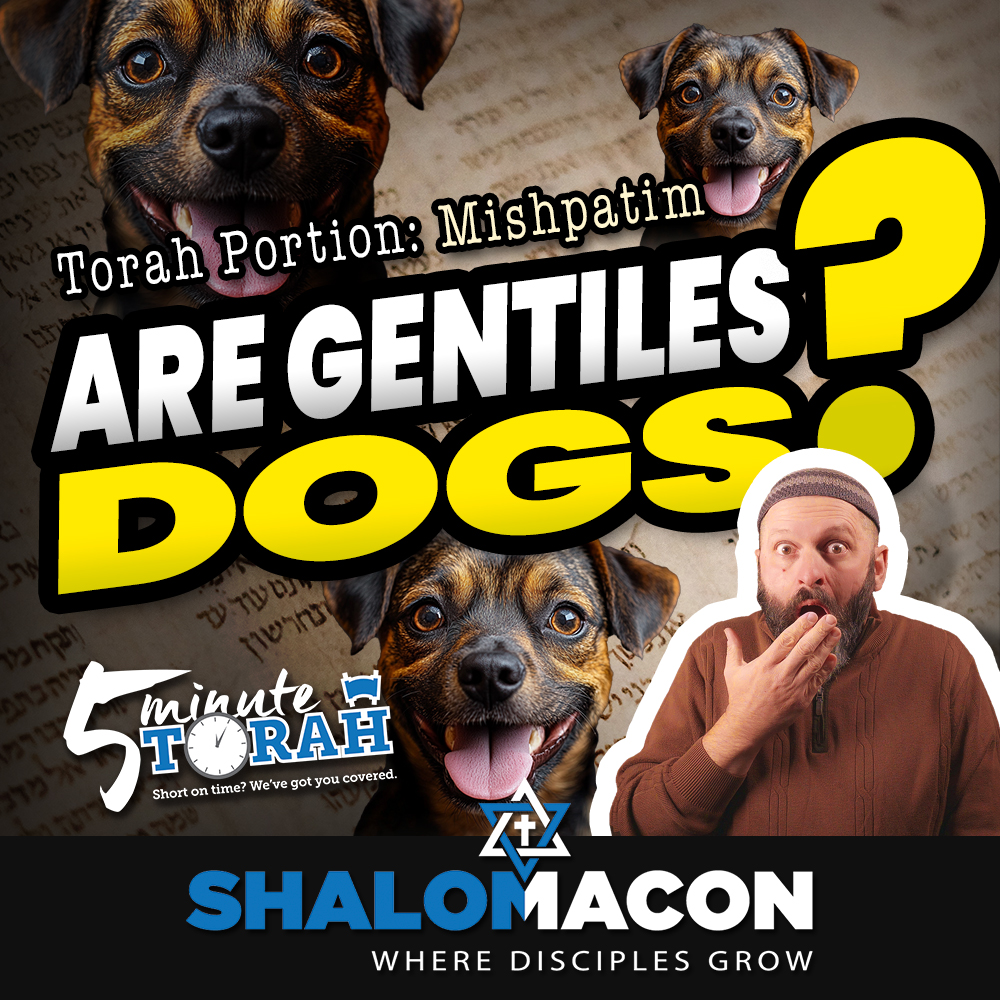Episode Transcript
[00:00:00] Speaker A: Matthew 15 records what may be the most politically incorrect statement in the New Testament uttered by Yeshua himself. A Canaanite woman, driven to desperation comes to Yeshua asking that he heal her demon possessed daughter. In our minds, we expect Yeshua to look at her with sad, compassionate eyes and then tell her that her daughter will be healed. But instead he calls her a dog. That's right, a dog. What's up with that? Well, believe it or not, this week's Torah portion might just give us the missing piece of the puzzle to help us understand this strange response of our beloved Savior. Please join me as we unravel this mystery together in this week's 5 Minute Torah.
Shalom and blessings from Shalom Macon, the place where disciples of Yeshua learn, connect and grow. I'm Darren and before we get into the five minutes of my five minute Torah commentary, let's cover a few quick facts about this week's Torah portion. This week we are studying the portion of Mishpatim. Exodus 21:1, 24:18 and here are the three things that you need to know about it. Number one holistic and inclusive Civil, criminal and religious Law. This portion is called mishpatim for a reason. It begins with the Lord saying, now these are the laws or judgments the Hebrew word mishpatim that you shall set before them. Last week we read about God giving the Torah to the children of Israel from atop Mount Sinai. This week, we begin to see some of the commandments that he gave them. This week's Torah portion contains a whopping total of 53 commandments. That's nearly 10% of the Torah's entire 613 enumerated commandments. That's quite a lot for this little Torah portion and shows how important it is in the scope of Torah study. But there's something we have to realize about the Torah. It's unlike any other system of law. The Torah applies to every aspect of life, not just religious or secular life. Why? Because it's an extension of God who views every human in a holistic manner and wants to rule over our entire being, not just what we do on the weekends. Number two Righteous Slavery the Torah's Unique perspective To most people, especially if you aren't familiar with the Torah, this may sound paradoxical at best and blasphemous at worst. Is there such a thing as righteous slavery? First, we need to understand that the Torah is addressing an issue that has been a central facet of culture for thousands of years. But until the giving of the Torah, there were no laws to actually protect slaves, they were simply considered property and had no rights of their own. The Torah changed this, especially in regard to Hebrew slaves who could only be indebted for a maximum of six years. The Torah commanded humane treatment of slaves with regulations that prohibited abuse or or cruelty see Exodus 21:2021. This acknowledgment of the inherent dignity of all individuals, including slaves, was a significant ethical departure from the brutal treatment of slaves in other societies. The Torah's laws for slaves were far ahead of their time, showing God's concern for those in unfortunate Circumstances and Number 3 Shalosh Regalim the three pilgrimage festivals included within the various laws of this Torah portion is the commandment for the Shalosh Regalim, the Three Pilgrimage Festivals the Lord tells the children of Israel, Three times in the year you shall keep a feast to me Three times in the year shall all your males appear before the Lord God. This is Exodus 23:14 17. The festivals listed here include Pesach, which is Passover, Shavuot, which is Pentecost, and Sukkot, which is Tabernacles. However, they can easily be missed because they're called by other names. Here they're called the Feast of Unleavened Bread, the Feast of Harvest, and the Feast of Ingathering in that respective order. This passage is unique in that it uses a phrase here that only appears in one other passage in the Torah and in the same context. The Lord tells Moses that all of the males shall appear before Ha Adon Hashem, which can be translated something like the Master Hashem. The only other time this phrase appears in the entire Hebrew Bible is in the Book of Isaiah.
[00:04:18] Speaker B: Are you ready to take your Passover Seder to the next level? Do you want to have a meaningful connection to Yeshua during Passover? Then grab a copy of cup of Redemption, my Messianic Passover Haggadah, and crank it up a notch. It not only walks you through the traditional Seder, but it also connects Yeshua's last meal and his suffering with the various elements of the Seder. It's great for homes and Messianic synagogues as well as churches, and gives step by step instructions for conducting your own Seder. It also includes an appendix with articles that answer many questions and objections people might have about a traditional seder, like why do we have an egg on the seder plate? And what's considered leavening? And is price low enough to snag a copy for everyone at your seder table, just use the link in the description box below to gear up early so you can be ready to make this Passover your best Passover.
[00:04:59] Speaker A: This week's Torah commentary is called Are Gentiles Really Dogs? And comes from my book, Five Minute Torah, Volume 3. Both the Gospels of Matthew and Mark record Yeshua's encounter with a Gentile woman who had come to him begging that he exorcise a demon from her daughter. With our modern egalitarian perception of Yeshua, we would think that he would immediately have compassion for this unfortunate girl and agree to help. However, the Gospels record for us what may be the Master's most shocking response to our Western ears. He told the woman, it is not right to take the children's bread and toss it to the dogs. This is Matthew 15:26. What? Did he really say that? Why did Yeshua make this seemingly racist statement against the poor Gentile woman who was begging for his help? How do we deal with this? Some people would like to censor Yeshua's words, while others would like to claim that some gentilephobic Jewish editor slipped that into the text shortly after it was written. This passage is definitely a stumbling block for people considering faith in Yeshua. In a time when we're being told to unhitch ourselves from the Jewish scriptures and the Jewish foundations of our faith, this passage can add fuel to the fire. Is it really reasonable for Gentiles to be called dogs by religious Jews of Yeshua's day, and even by Yeshua himself? Where does this idea stem from? Well, if we look at this week's Torah portion, we can see its origin. You shall be consecrated to me therefore you shall not eat any flesh that is torn by beasts in the field. You shall throw it to the dogs. This is Exodus 22:30 or 31 in a Christian publicized Bible. Commenting on this verse, Rashi interprets this to mean that torn flesh may be given to a Gentile. But how does he and other commentators come to this conclusion of equating Gentiles with dogs? In this passage, the question is easily answered when we turn to Deuteronomy and see almost the exact same language. Do not eat anything you find already dead. You may give it to the foreigner residing in any of your towns, and they may eat it. Or you may sell it to any other foreigner. But you are a people holy to the Lord your God. Deuteronomy 14:21. In both of these passages, we see two things that overlap. First, an issue of how to deal with meat that is not permitted to the children of Israel. Second, a statement that the children of Israel are consecrated or holy to the Lord. The passage in Deuteronomy seems to be a clarification of the passage in Exodus explaining that the forbidden meat may be given to or sold to Gentiles, that is dogs. From this connection arose the use of the term dog, the Hebrew word kelevin, for a gentile. But is this necessarily bad? Dogs are animals that live by their animal instincts. They can't help the way they have been created. When the Torah seems to refer to Gentiles as dogs, it is referring to the ones who live by their animalistic instincts and pagan ways. As we've seen, however, as Gentiles, we have the ability to rise above our base nature and be led by our spiritual nature. When this happens, we transition from a dog to a man and even have the potential to rise to the level of a tzaddik. Although Yeshua's call began with the Jewish people, it wasn't exclusive to them. He calls the entire world to deny themselves and take up their cross and follow me. Matthew 16:24 When Yeshua referred to the Gentile woman as a dog, she didn't show any sign of offense. She didn't divest and boycott Israel, start a website to expose the Talmud, declare the Torah to have been replaced, or unhitch herself from everything Jewish. She simply turned the situation to her advantage. In true humility, she replied, even the dogs eat the crumbs that fall from their master's table. Matthew 15:27 When Yeshua heard her response, not only did he immediately grant her request and heal her daughter, but he also praised her for her great faith. What can we learn from this? Rabbi Abraham Twersky, of blessed memory, said, even if you are what your parents made you, if you stay that way, it is your own fault. What he means is that throughout our lives we are supposed to grow, to change, and to develop. If we simply remain the same person we were when we were born, then we have thrown away an invaluable opportunity for growth. When we are confronted with the fact that gentiles are viewed differently by not only rabbinic texts, but also by the Torah and Yeshua, we can respond in one of two ways. We can begin barking and attacking like a dog and prove that we are one. Or we can respond in humility and show our humanity. Are gentiles really dogs? That really all depends on us. As Yeshua taught, I tell you, many will come from east and west and recline at table with Abraham, Isaac, and Jacob in the kingdom of heaven. Matthew 8:11. We may have been born into the nations, a people that have historically been pagans dogs in comparison to the Jews who were given the revelation of the one true God at Sinai. However, through faith and humility, we can show that we aren't living as pagans, but putting our trust in the God of Abraham, Isaac and Jacob to make a place for us at the table. If you want to learn more about how Gentiles like myself have been grafted into the family of God through Yeshua, then check out my five minute Torah called Gentiles Are Grafted In. Just click on the link right here.



